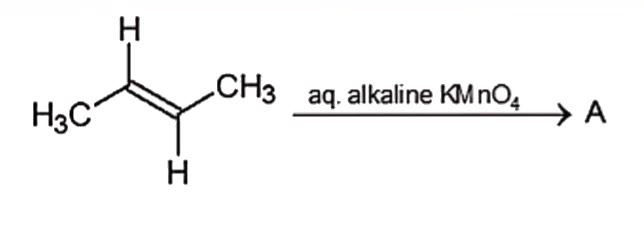Which of the following is not true in case of reaction with heated copper at 300∘C ?
Phenol → Benzyl alcohol
Secondary alcohol → Ketone
Primary alcohol → Aldehyde
Tertiary alcohol → Olefin .
The correct Answer is:A
To solve the question regarding the reactions of alcohols and phenols with heated copper at 300°C, we need to analyze the behavior of different types of alcohols and phenols under these conditions.
1. Understanding the Reaction Conditions:
- We are heating copper at 300°C. This temperature is significant for the dehydration reactions of alcohols.
2. Primary Alcohols:
- When a primary alcohol is heated with copper at 300°C, it undergoes oxidation to form an aldehyde.
- Example: Ethanol (a primary alcohol) will convert to acetaldehyde.
3. Secondary Alcohols:
- Secondary alcohols, when heated with copper at this temperature, are oxidized to form ketones.
- Example: Isopropanol (a secondary alcohol) will convert to acetone.
4. Tertiary Alcohols:
- Tertiary alcohols undergo dehydration to form olefins (alkenes) when heated with copper at 300°C.
- Example: Tertiary butyl alcohol will convert to isobutylene.
5. Phenols:
- When phenol is heated with copper at 300°C, it does not convert to benzyl alcohol. This reaction does not occur under these conditions.
- Conclusion: The statement that phenol can be converted to benzyl alcohol by heating with copper at 300°C is not true.
6. Identifying the Incorrect Statement:
- Based on the above reactions, the statement regarding the conversion of phenol to benzyl alcohol is the only one that is incorrect.
Final Answer:
The statement that is not true in the case of reaction with heated copper at 300°C is that phenol can be converted to benzyl alcohol.
---
- We are heating copper at 300°C. This temperature is significant for the dehydration reactions of alcohols.
- When a primary alcohol is heated with copper at 300°C, it undergoes oxidation to form an aldehyde.
- Example: Ethanol (a primary alcohol) will convert to acetaldehyde.
- Secondary alcohols, when heated with copper at this temperature, are oxidized to form ketones.
- Example: Isopropanol (a secondary alcohol) will convert to acetone.
- Tertiary alcohols undergo dehydration to form olefins (alkenes) when heated with copper at 300°C.
- Example: Tertiary butyl alcohol will convert to isobutylene.
- When phenol is heated with copper at 300°C, it does not convert to benzyl alcohol. This reaction does not occur under these conditions.
- Conclusion: The statement that phenol can be converted to benzyl alcohol by heating with copper at 300°C is not true.
- Based on the above reactions, the statement regarding the conversion of phenol to benzyl alcohol is the only one that is incorrect.
The statement that is not true in the case of reaction with heated copper at 300°C is that phenol can be converted to benzyl alcohol.
Topper's Solved these Questions
- BOOK - NCERT FINGERTPS ENGLISHCHAPTER - ALCOHOLS,PHENOLS AND ETHERSEXERCISE - HOTS7videos
ALCOHOLS,PHENOLS AND ETHERS
- BOOK - NCERT FINGERTPS ENGLISHCHAPTER - ALCOHOLS,PHENOLS AND ETHERSEXERCISE - EXEMPLAR PROBLEMS14videos
ALCOHOLS,PHENOLS AND ETHERS
- BOOK - NCERT FINGERTPS ENGLISHCHAPTER - ALDEHYDES, KETONES AND CARBOXYLIC ACIDSEXERCISE - Assertion And Reason15videos
ALDEHYDES, KETONES AND CARBOXYLIC ACIDS
Similar Questions
Knowledge Check
- Question 1 - Select One
Which of the following is not true about a reversible reaction ?
A(a) The reaction does not proceed to completion.B(b) It cannot be influenced by catalystC(c) Number of moles of reactants and products is always equal.D(d) It can be attained only in a closed container. - Question 2 - Select One
Which of the following is true in case of electrolytic refining ?
AImpure metal is made cathodeBImpure metal is made anodeCImpure metal is made cathode and pure metal as anodeDBoth electrodes must be of pure metal - Question 3 - Select One
Which of the following would be true for the reaction shown?
 AThe rate ofthe reaction depends only on the alkyl bromide concentration.BThe rate ofthe reaction depends only on the methanol concentrationCThe rate of the reaction depends on both the alkyl halide concentration and the methanol concentration.DThe rate ofthe reaction depends on the concentration ofneither reactant.
AThe rate ofthe reaction depends only on the alkyl bromide concentration.BThe rate ofthe reaction depends only on the methanol concentrationCThe rate of the reaction depends on both the alkyl halide concentration and the methanol concentration.DThe rate ofthe reaction depends on the concentration ofneither reactant.
Which of the following is not true for SN1 reaction ?
View Solution
Which one of the following is true about this reaction ?View SolutionWhich of the following affect the heat of reaction?
View SolutionWhich of the following statements is true is case of alkyl halides ?
View SolutionWhich of the following statement is true in case of revenue receipts?
View Solution

